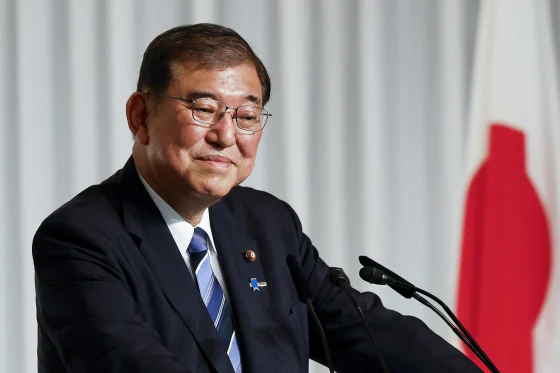Shigeru Ishiba
Former defense minister Shigeru Ishiba is set to become Japan’s next prime minister after securing victory in a closely contested leadership race within the ruling Liberal Democratic Party (LDP).
On Friday, Ishiba, 67, won his fifth and final attempt to lead the LDP, defeating hardline nationalist Sanae Takaichi in a run-off vote. The election was marked by unpredictability, with a record nine candidates in the field, making it one of the most competitive leadership contests in decades.
Ishiba’s victory essentially guarantees his position as Japan’s next premier, as the LDP holds a majority in the Japanese parliament. In a post-election news conference, he emphasized the critical need for Japan to finally emerge from its prolonged deflationary period.
He underscored the importance of revitalizing consumer spending as a means to lift the country out of economic stagnation and inflationary pressures. “I will ensure Japan emerges from deflation,” Ishiba declared, vowing to continue and accelerate outgoing Prime Minister Fumio Kishida’s policies aimed at increasing household income through wage hikes.
Ishiba’s economic strategy will involve cushioning the impact of rising inflation on households, a key concern as Japan grapples with global economic pressures.
He also faces the challenging task of addressing Japan’s rising living costs and rebuilding trust in the LDP, which has been plagued by scandals that significantly damaged its approval ratings. His victory follows Kishida’s decision to step down in August, triggered by a series of scandals that led to plummeting public support for the party.
On the international front, Ishiba must navigate a volatile security environment in East Asia, which includes threats from nuclear-armed North Korea and the growing influence of China. His approach to Japan’s diplomatic relationship with its key ally, the United States, will also come under scrutiny.
During his campaign, Ishiba expressed the need for a more balanced relationship with Washington, signaling a potential shift in Japan’s foreign policy stance.
Notably, he called for the creation of an “Asian NATO” to counterbalance China’s growing military presence in the region, a proposal that may strain relations with Beijing and has already been dismissed as premature by senior U.S. officials.
Despite potential diplomatic challenges, Ishiba has garnered support from Washington. U.S. Ambassador to Japan, Rahm Emanuel, congratulated him on his victory via social media, expressing eagerness to strengthen the U.S.-Japan alliance under his leadership.
Ishiba’s political journey has been marked by his outspoken and often controversial views, which have earned him both allies and adversaries within the LDP. After entering parliament in 1986 following a brief banking career, he became known for his dissenting opinions on issues such as nuclear energy and family policies.
His opposition to the LDP’s stance on nuclear energy and his push for more progressive family policies, including allowing married couples to use separate surnames, have set him apart from other party leaders.
These contrarian views contributed to his previous four failed bids for leadership. However, his persistence and popularity among rank-and-file members of the LDP and the public helped him secure victory in what he called his “final battle.”
Financial markets responded positively to Ishiba’s election. The Japanese yen, which had earlier suffered losses, rebounded following his victory.
Investors view Ishiba as a critic of Japan’s past aggressive monetary stimulus policies, raising hopes of a more balanced economic approach under his leadership.
As Shigeru Ishiba prepares to take office as Japan’s next prime minister, his administration faces the monumental tasks of steering the country out of deflation, addressing public dissatisfaction with the LDP, and maintaining stability in a region marked by complex geopolitical dynamics.
I am a dynamic professional, specializing in Peace and Conflict Studies, Conflict Management and Resolution, and International Relations. My expertise is particularly focused on South Asian Conflicts and the intricacies of the Indian Ocean and Asia Pacific Politics. With my skills as a Content Writer, I serve as a bridge between academia and the public, translating complex global issues into accessible narratives. My passion for fostering understanding and cooperation on the national and international stage drives me to make meaningful contributions to peace and global discourse.










